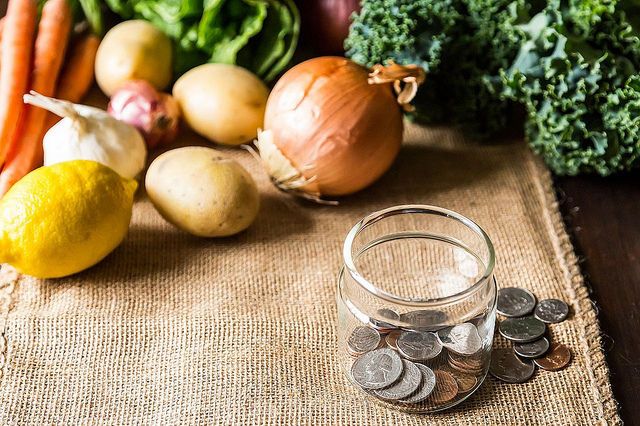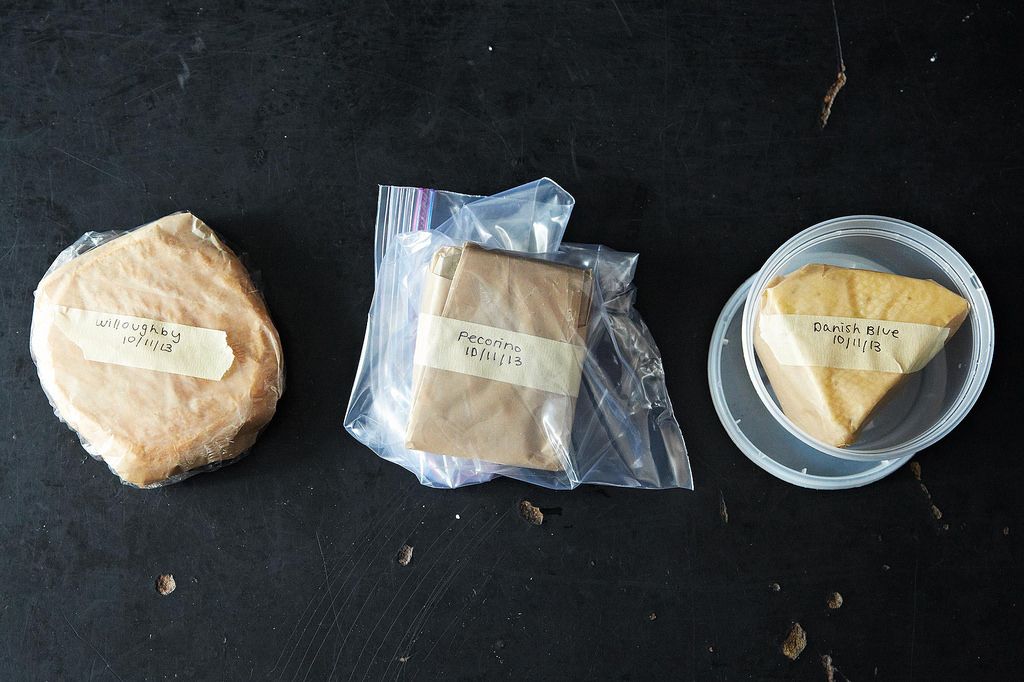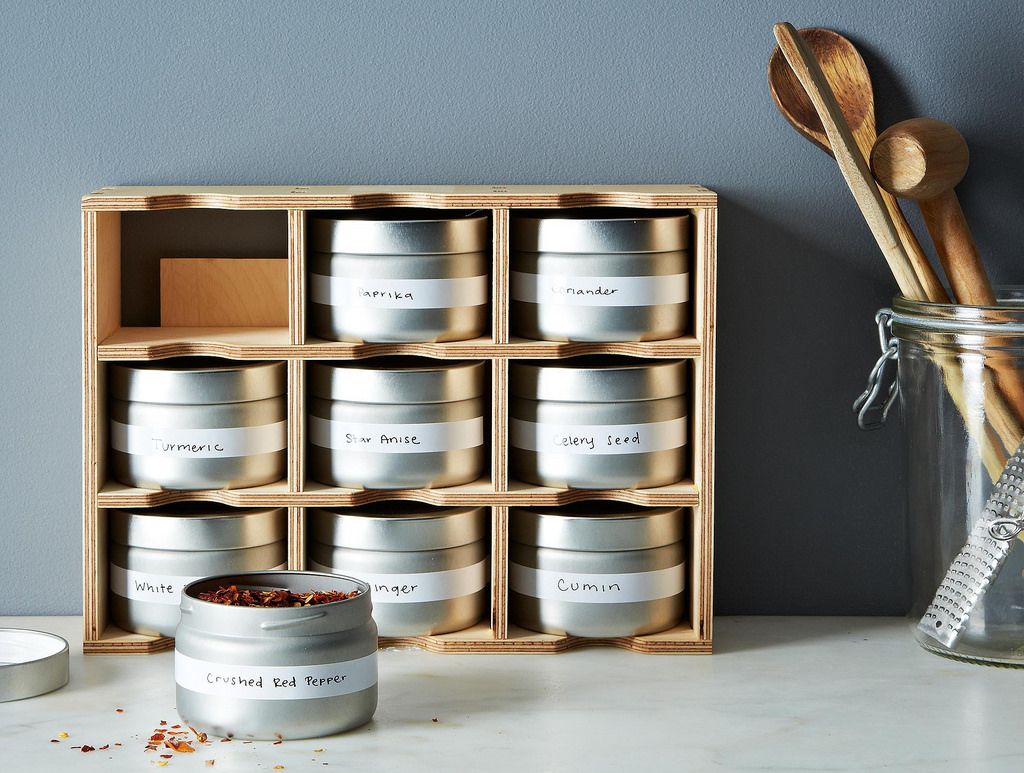There are so many great conversations on the Hotline -- it's hard to choose a favorite. But we'll be doing it, once a week, to spread the wealth of our community's knowledge -- and to keep the conversation going.
Today: Trying new recipes and purchasing a long list of ingredients can sometimes strain your budget -- here's how to experiment in the kitchen without breaking the bank.

We know the basics of frugal food: Pack your lunch, eat lots of beans, and make your own versions of store-bought favorites. But even if you’re not trying to stock a broke kitchen, constantly buying different ingredients for new recipes can make any budget feel tight. This week on the Hotline, Samlawali grappled with exactly that dilemma: “How do you shop and cook for two people and have it not cost a fortune? I love trying out recipes, but I just don’t have the money it seems to cost.” Luckily the community was full of helpful ideas:
Eat Seasonally
-
Monita sums it up simply, "Always buy produce that's in season," and Dave on the grill agrees: "My wife and I started a hanging herb garden on our back porch -- with peppers too! We also hit up the farmers market, which has in season veggies on the cheap."
-
Kristen W. recommends joining a CSA: "Getting a small weekly farm box has lowered my weekly grocery bill significantly. Although the cost of the box is reasonable, that is not the reason for the savings; rather, it is because the farm box has totally changed the way I cook. My meals are now ingredient-driven, rather than recipe-driven, and those ingredients driving the cooking now tend to be produce, as opposed to meat. Cooking from the box (and, let's be honest, watching A LOT of Chopped episodes) has taught me to be much bolder with making substitutions in familiar recipes, so that I can use what I've got for the week, no more, no less."
- When you're shopping for vegetables at a grocery store, Maedl suggests sticking to unpackaged items: "I can pick out the freshest produce that will last a bit longer, plus I get the quantity I want, not the quantity the store wants to get rid of."
-
Sam1148 has another hint for getting fresh vegetables in small portions at the grocery store -- visit the salad bar. He instructs: "Load up on lightweight stuff: spinach, kale, other good greens, and mushrooms. No dressing or heavy stuff like cucumbers or melons. The weight of those dry things is far cheaper than an equivalent bagged item -- which often go bad when you're not feeding 4 people."

Use Good Ingredients -- Store Them Properly and Balance Consumption
- This one might seem counter-intuitive, but sometimes it's okay to spend more on a quality ingredient. A little bit can go a long way and make a big difference in a meal. One example is cheese: Jan Weber acknowledges that it's an expensive item, so it's important to treat it well and store it properly, in order to maximize shelf-life.
-
Inpatskitchen says, "A splurge once a week is good for the body and soul!" But she maintains a good balance, explaining: "I'll make a bean chili one night, so that the next I don't feel as guilty when I splurge on a great piece of fish or a prime cut of beef."
-
Cookinginvictoria balances meat consumption too: "My family is not vegetarian, but over the past few years we have really cut down on our consumption of chicken, pork, and beef. We usually will feature a meal with animal protein just once or twice a week. Most of our meals consist of fresh fruit and vegetables, a fair amount of fish, various grains, eggs, and legumes. We evolved into this style of eating over time, and we now save a sizable amount of money on our grocery bills."
- Another way to use quality ingredients without purchasing a large quantity of something is to borrow from a friend. Jan Weber explains: "Chances are, a foodie friend of yours has ingredients that he or she couldn't possibly use up (Tamarind paste, anyone?). So why not ask to borrow a few bits? Maybe you could even trade! This also goes for crockery -- why buy a baking pan or a springform pan when your cheesecake-loving friend has four of them?"
More: Still feeling pinched? Check out our favorite frugal tips.
Plan Ahead
-
Cookinginvictoria recommends trying to be really, really organized in the kitchen: "Plan your meals a week or even a month in advance. Try to waste as little food as possible. Use vegetable scraps and chicken or beef bones to make stock. Try not to buy more food than you know that you will eat. Keep an inventory of your refrigerator, freezer, and pantry, so that you only purchase what you are running low on, or what is planned for that week or month's menu."
-
LucyS also finds that planning ahead makes an enormous difference: "We always used to end up throwing out things we didn't get around to cooking, or we'd find ourselves with nothing to eat and order takeout (also expensive). Every weekend, we plan out exactly what we're going to cook every night that week, write it down on the fridge, and make a grocery list before shopping. It has cut down hugely on waste and takeout nights."
-
Aobenour suggests planning to stick to one cuisine each week: "a week of Thai, a week of Mexican, a week of Italian, etc. That way, when you buy speciality ingredients, you're more likely to use then up and get your money's worth."
-
Maedl and boulangere recommend searching out and using recipes that are already scaled for two people.

Shop Smart
-
Sam1148 recommends stocking up on bulk spices: "Go in with a list, and have some old spice bottles ready or airtight containers ready for the new spices. I can replace the major spices I use for about 5 dollars twice a year." He also suggests saving money by shopping at ethnic stores for things like rice, lentils, some speciality spices, semolina flour, bulgur wheat (at a Middle Eastern store), soy sauce, and fish sauce (at Asian store).
-
Monita says: "Buy larger quantities of shelf stable products that will keep, like rice and other grains. Also buy large sizes of oils and vinegars, and make your own salad dressings."
-
Flirty Foodie sticks to her favorite supermarkets' weekly sales: "Supermarkets change sale items every few weeks, and usually there is at least one type of each protein (meat/poultry/seafood) on sale."
-
Monique Richardson suggests using a sale app like Favado: "You can pick the stores you prefer to shop in your area. You can save the items you're interested in, and shop from the list, which saves money AND time (no mailer browsing or aisle wandering)."
Save for Later
-
Julie is a fan of her small deep freezer, saying: "It's been fantastic for saving leftover ingredients and meals. For me, the hardest part of cooking for two is using up fresh ingredients before they go bad -- with the freezer I can use what I need and freeze the rest for later in standard portions (labeled and dated). It really cuts down on waste, and it's convenient to have a stash of ingredients and meals in the freezer. Mine is full to the brim now and I have no idea how I lived with my tiny refrigerator freezer for so long!"
-
Jan Weber and bigpan recommend buying or borrowing a home vacuum sealer. It allows you to buy larger quantities of fresh meat, fish, and poultry and freeze them for later, without sacrificing flavor. Bigpan also seals fresh summer vegetables after blanching and homemade stock after freezing in ice cube trays, and freezes them both for later. Jan Weber seals up grains like rice, quinoa, and polenta, as well as roasted coffee.
Tell us: How do you experiment in the kitchen and still stick to a budget?
Photos by James Ransom




See what other Food52 readers are saying.